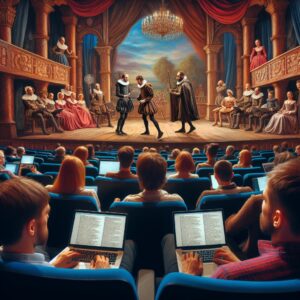I have not yet seen Andrew Scott’s Hamlet, though it appears universally loved. It regularly comes up on the Shakespeare Reddit as one of the most approachable takes on the character ever filmed.

I wonder, then, if they caught it on video when he apparently stopped his performance to stare down a rude theatre-goer who opened up a laptop during “To be or not to be”?
“When I was playing Hamlet, a guy took out his laptop — not his phone, his laptop — while I was in the middle of ‘to be or not to f***ing be’,” Scott said. “I was pausing and [the stage team] were like, ‘Get on with it’ and I was like, ‘There’s no way’.”
On the one hand, I can’t disagree with him. You probably paid a lot of money for a live theatre ticket like that. And you’re going to fire up the laptop? Just to hell with everybody around you, right? Forget stopping the play, I want you on the blacklist for that theatre so you never see another live show. All this guy got was a stare down. Also, go ahead and stare him down for his phone, too. It’s all rude.
On the other, does anybody see what bothers me in the above quote? In the context of being interrupted during the most famous soliloquoy in the English language, our Hamlet says “like” twice. “He was like blah, and I was like, blah!” It’s amazing what’s happened to the language in 400 years. And I don’t mean that in a good way.
Where’s Patti LuPone When You Need Her
Maybe Mr. Scott just needs some years to get tired of it. Broadway legend Patti LuPone is famous for letting the audience know how she feels about them. In 2015 she marched into the audience and ripped the phone out of one audience member’s hand. In 2009 she started yelling at people who, ignoring the announcement, were taking pictures of the show. Gloriously, this moment lives on via YouTube.
I need to get to more live theatre, in the hopes of catching one of these moments. Who said Shakespeare is boring?

Dame Helen Mirren once left the stage then left the theatre to berate drumming street musicians who could be heard inside. THAT’S respecting the play and the audience.